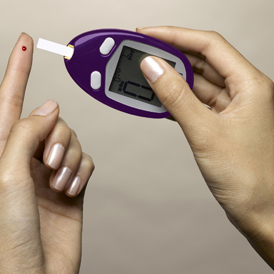More than 20,000 deaths from diabetes ‘preventable’
A report into diabetes mortality has discovered that 24,000 deaths could have been prevented if sufferers had managed their disease better.

The report from the National Diabetes Audit described what it called “shocking statistics” into the mortality rate among people with diabetes in the UK, finding that many people with the disease die early from causes that could have been avoided through “better management of their condition”.
Barbara Young, Chief Executive of Diabetes UK, said: “These figures are incredibly alarming as there is no reason why people with diabetes cannot live long and healthy lives if they receive the right care and support to help them manage their conditions.
Ms Young said that while self-management was key, it was also vital that people with diabetes received the care they need to help them manage their condition in the first place.
‘We know that half of people with Type 2 diabetes and more than two thirds of people with Type 1 diabetes are not receiving the care they need to stay healthy, so it is imperative we take action now to stop even more lives being needlessly cut short,” she said.
The report also found that compared to the general population, young people with diabetes aged 15 to 34 had the highest death risk. Although the figures were worrying for the age group, Diabetes UK said it did not have enough information to know the causes of these deaths. However, the charity emphasised that with the right education, care and support, people with diabetes can, and do, go on to live long and healthy lives.
Diabetes and insulin: your questions answered
‘If only I had known’
Elaine Clark’s husband John died in 2007 at the age of 51 having been diagnosed with diabetes 17 years earlier.
In the last seven years of his life, he was completely blind, his kidneys had failed and his limbs stopped working; he had suffered several hearts attacks and he had been diagnosed with dementia.
“Everything stopped working,” as Elaine says. And she believes that all of his serious conditions were inextricably linked to his diabetes.
If both he and she had known just how serious diabetes was, how, as she describes ‘it became a fatal disease’, John may still be alive today with her and their three children.
And he may have avoided nearly a decade of abject suffering. “When he was first diagnosed with diabetes, we were only told the basics: what it was and what we had to do to treat it: not the potential severity or how not taking care of yourself could lead to your death,” she said.
“John was a stubborn Yorkshireman and didn’t take proper care of himself: not eating well, smoking, drinking sometimes not taking his medication, etc. And its hard to tell someone to stop doing what they like, eating what they like, but I think that if he received the proper education, things could have turned out differently.
“More importantly,” she added, “If I had known the truth about diabetes, I would have never let that happen to him. I have to live with that guilt every day.”
Elaine is working with Diabetes UK to push for better education of the disease, and says that there has been a chronic failure by the medical profession and by governments to inform people about it. She said that of the meagre funding available to host diabetes sufferers group meetings, much of it is being cut.
“What is better: to spend £9,000 a year on a premises for people to meet, or pay for someone whose body has failed to be in hospital for 33 weeks.”
Elaine, from Barking in East London, is also trying to persuade the NHS to start up a diabetes-only helpline to assist sufferers and family members, who may otherwise not be aware that serious symptoms could be attributable to diabetes.
And she is also campaigning for more funding for better education of the affliction to be brought into schools. Referring to the part of the report which discovered that compared to the general population, young people with diabetes aged 15 to 34 had the highest mortality risk, she said:
“It’s no wonder, it’s poor education, and kids and young people tend to hide the fact that have diabetes, because they still want to fun things that they’re friends are doing: going for a drink and that kind of thing.”
“Diabetes is not an immediate death sentence,” Elaine said. “It only becomes one if you don’t know that it potentially can be.”
-
Latest news
-
Year of civil war in Sudan ‘a nightmare of hunger and displacement’4m

-
Israel fears repeat Iran attack, says former editor of Jerusalem Post4m

-
How long could it take to clear the Rwanda asylum seeker backlog?3m

-
Rwanda asylum boost for Sunak as bill expected to become law2m

-
Donald Trump trial: day one of historic Stormy Daniels court case4m

-




